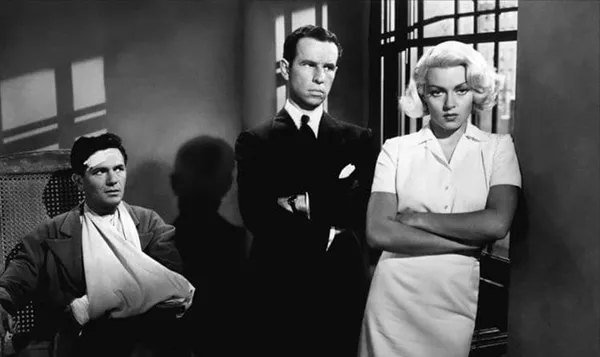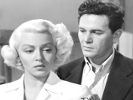Eye For Film >> Movies >> The Postman Always Rings Twice (1946) Film Review
The Postman Always Rings Twice
Reviewed by: Jennie Kermode

Some films are remembered because of their striking visuals, some for their witty scripts. Some attract attention due to powerful performances and some because of thrilling stories. The Postman Always Rings Twice has all these qualities, but it makes its mark on the psyche. It's sultry, dangerous, black as midnight on a moonless night, and impossible to forget.
Lana Turner is Cora: young, beautiful, married, bored. Barbara Stanwyck's character in Double Indemnity is often referred to as the greatest of the classic femmes fatales, but Cora certainly gives her a run for her money, and for all that Jessica Lange, in the 1981 remake, delivered in terms of explicit sex and sexual chemistry, Cora's smouldering repression here generates more heat. Contrary to popular belief, this isn't the original version of the film - earlier versions were made in France and Italy whilst Warner Bros. waited for a more politically favourable environment to develop in the US, which wouldn't lead to immediate censorship. Cora's seduction of drifter Frank (John Garfield) and plot to murder her husband (Cecil Kellaway) were seen as deeply troubling themes at the time.

The film still has the power to unsettle viewers today. Although the moral logic of its conclusion may now seem a bit cheesy, in a way that belongs as much to the character of Frank as to the story, and there is never any pretence that he's a sophisticated man. These are not the comfortable middle class characters of modern cinema, scheming over diamonds or multi million dollar legacies. Cora's ambition is simply to own the diner where she works, and where she first meets Frank. In a way it is the pettiness of their goals that makes the pair so compelling. They could be anybody; they could be sitting somewhere in the cinema audience. Yet despite this, and though her husband is not unsympathetic and she is utterly cold blooded, there's something more to what Cora is doing that anybody might identify with: in her own way, she's making a bid for freedom.
Given the climate of the time, and still more so of the years during which the film was delayed, Cora is a revolutionary character, and both Turner and director Tay Garnett clearly know it. It was a time when villainy was still colour coded in most films, but Cora wears white. Her simple dresses might be part of any respectable woman's wardrobe. What she does with them is something else. It's the strongest performance of Turner's career, though admittedly one of few that really brought her acting talents to the fore. Garfield (with whom she had a brief and apparently disappointing liaison during shooting, though their chemistry is sizzling onscreen) has difficulty keeping up, but brings enough of a brutal edge to Frank to keep the viewer aware that he too is dangerous in his way, perhaps even to her. His bitterness as their love affair turns sour delivers some of the darkest moments in the film and, by contrast, brings a tender edge to love scenes which both actors make believable even when it becomes hard to imagine how the characters can tolerate each other.
All this action is captured by cinematographer Sidney Wagner, at the height of his abilities and just a year before his tragic death from cholera. Better known for his work on early westerns, he took the extremes of light and shadow he had encountered in the desert and created some of the most beautifully sinister scenes in noir, with those set after dark particularly impressive as shades of black are layered across one another and characters are illuminated in outline by car headlights or the light escaping through cracks in doors. The tension and sense of secrecy and peril is much enhanced by these images so that the film remains compelling even when nobody in it is actually likeable.
The Postman Always Rings Twice is a masterclass in noir. Garnett would never achieve these heights again. Garfield would have little chance to, finding himself blacklisted during the McCarthyite witch hunts and dying of a heart attack in 1952, aged just 39. Turner would look back on the film as one of her favourites. She was not alone in that.
Reviewed on: 18 Feb 2017















